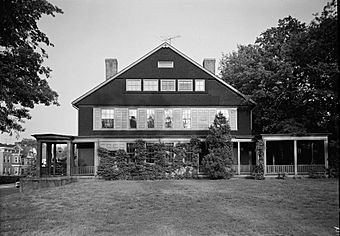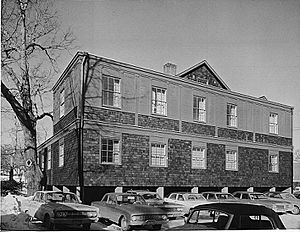Atwater–Ciampolini House facts for kids
Quick facts for kids |
|
|
Joseph Atwater House
|
|
|
U.S. Historic district
Contributing property |
|

Front view, in 1964
|
|
| Location | 321 Whitney Ave., New Haven, Connecticut |
|---|---|
| Built | 1890-92 |
| Architect | Babb, Cook and Willard |
| Architectural style | Shingle |
| Part of | Whitney Avenue Historic District (ID88003209) |
| Added to NRHP | February 2, 1989 |
The Atwater–Ciampolini House is a special old house in New Haven, Connecticut. It is also called the Charles Atwater House. You can find it at 321 Whitney Avenue. This house is a great example of the Shingle style of architecture. It was designed by famous architects named Babb, Cook and Willard. The house was built between 1890 and 1892. For many years, it was used as offices for an insurance company. Today, it is a law office.
Contents
Discovering the Atwater–Ciampolini House
What is Shingle Style Architecture?
The Atwater–Ciampolini House is an important example of the Shingle style of architecture. This style was popular in the United States in the late 1800s. Houses in this style often have exteriors covered in wooden shingles. They also feature wide porches and unique window designs.
The Atwater–Ciampolini House shows these features. It has a front with a pointed roof section called a gable. It also has long, narrow windows grouped together. The outside of the house is covered in shingles. The house is two and a half stories tall.
A book called The Shingle Style by Vincent Scully talks about this house. This book is very important for understanding this type of architecture.
History of the House
The Atwater–Ciampolini House has an interesting history. In 1890, the property was bought by Helen G. Atwater. She was the wife of Charles Atwater. Charles Atwater passed away in 1916. Helen then married Ettore Ciampolini in 1922. This is how the house got its two names: Atwater and Ciampolini.
Later, in 1968, an insurance company called Thompson and Peck bought the house. In 1969, a two-story addition was built at the back of the house. The architect for this addition was Henry Miller.
The house is part of the Whitney Avenue Historic District. This district was added to the National Register of Historic Places in 1989. This means the house is recognized as an important historical building. It was also photographed and documented by the Historic American Buildings Survey.
Experts have compared the design of the Atwater–Ciampolini House to other famous buildings. They say it reminds them of the William Low House. That house was designed by another well-known firm, McKim, Mead and White.
See Also
 | Charles R. Drew |
 | Benjamin Banneker |
 | Jane C. Wright |
 | Roger Arliner Young |


